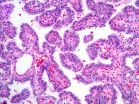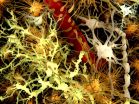(Press-News.org) DALLAS – Oct. 23, 2014 – A hormone seen as a popular target to develop weight-loss drugs works by directly targeting the brain and triggering previously unknown activity in the nervous system, UT Southwestern Medical Center obesity researchers have found.
The fibroblast growth factor 21 (FGF21) hormone has been a key target for developing weight-loss drugs because the protein increases energy expenditure, causing the body to burn calories. But how the hormone worked wasn't known until now.
UT Southwestern researchers tracking the hormone discovered that FGF21 acts directly on the brain, activating another hormone called corticotropin-releasing factor (CRF). CRF then stimulates the nervous system, activating brown adipose tissue, which generates body heat by burning fat.
"FGF21 is well known for playing a role in weight loss and we had previously shown that the hormone can act directly on the brain in mice to influence functions like reproduction. In the new study we show that FGF21 also acts directly on the brain to regulate obesity," said Dr. Steven Kliewer, Professor of Molecular Biology and Pharmacology, who holds the Nancy B. and Jake L. Hamon Distinguished Chair in Basic Cancer Research at UT Southwestern.
Specifically, researchers found that the FGF21-CRF pathway activates a part of the nervous system that controls various involuntary body functions, called the sympathetic nervous system, to signal to brown fat. Brown fat is often considered the "good" fat that actually burns energy by generating heat — called thermogenesis — to protect from the cold. Once brown fat receives a "weight loss" signal, the tissue burns fat.
The findings, published in the journal Cell Metabolism, are important to ongoing efforts to understand obesity at a molecular level and thus better respond to the obesity epidemic.
More than one-third of U.S. adults — about 35 percent — are obese, according to the Centers for Disease Control, with obesity-related conditions such as heart disease, stroke, type 2 diabetes, and certain types of cancer among the leading causes of preventable disease. Obesity also takes a dramatic financial toll, costing an estimated $150 billion annually or, on an individual basis, an additional $1,429 in higher medical costs than those of normal weight.
"We have made great strides in understanding obesity in recent years," said senior author Dr. David Mangelsdorf, Chairman of Pharmacology, a Howard Hughes Medical Institute investigator, and holder of the Distinguished Chair in Pharmacology, and the Raymond and Ellen Willie Distinguished Chair in Molecular Neuropharmacology in Honor of Harold B. Crasilneck, Ph.D. "What this research shows is that the central nervous system must be considered when looking for weight loss treatments."
Dr. Mangelsdorf and Dr. Kliewer are members of UT Southwestern's Taskforce for Obesity Research (TORS), composed of investigators from diverse disciplines who examine the behavioral, metabolic, and cellular mechanisms that cause obesity and metabolic syndrome. Their primary goal is to elucidate how the brain regulates food intake and energy expenditure, and to determine how dysregulation of glucose and lipid metabolism in the liver causes the metabolic syndrome. The long-term goal is to develop more directed approaches to prevent obesity and treat related metabolic complications. Dr. Mangelsdorf and Dr. Kliewer are part of the team studying the molecular biology of energy metabolism.
INFORMATION:
Other UT Southwestern researchers in this latest study include postdoctoral researchers Dr. Bryn Owen, Dr. Xunshan Ding, Dr. Katie Colbert-Coate, and Dr. Angie Bookout.
The study was supported by the National Institutes of Health, the Robert A. Welch Foundation, the American Heart Association, and the Howard Hughes Medical Institute.
About UT Southwestern Medical Center
UT Southwestern, one of the premier academic medical centers in the nation, integrates pioneering biomedical research with exceptional clinical care and education. The institution's faculty includes many distinguished members, including six who have been awarded Nobel Prizes since 1985. Numbering more than 2,700, the faculty is responsible for groundbreaking medical advances and is committed to translating science-driven research quickly to new clinical treatments. UT Southwestern physicians provide medical care in 40 specialties to about 92,000 hospitalized patients and oversee approximately 2.1 million outpatient visits a year.
DENVER – Sixteen institutions across Europe collaborated together to show for the first time that a semi-quantitative anaplastic lymphoma kinase (ALK) protein expression test, immunohistochemistry (IHC), is reliable amongst several laboratories and reviewers when test methodology and result interpretation are strictly standardized and the scoring pathologists are appropriately trained on the test.
ALK tyrosine kinase inhibitors (TKIs) shrink tumors and increase progression-free survival in late-stage non-small cell lung cancer (NSCLC) patients positive for ALK as ...
DENVER –CANARY, Computer-Aided Nodule Assessment and Risk Yield, is a novel software tool developed at Mayo Clinic that can automatically quantitate adenocarcinoma pulmonary nodule characteristics from non-invasive high resolution computed tomography (HRCT) images and stratify non-small cell lung cancer (NSCLC) patients into risk groups that have significantly different disease-free survival outcomes.
The majority of NSCLC patients are diagnosed with advanced-stage disease which is concomitant with an exceptionally poor prognosis, 5-year survival rate of 4%. In ...
In individuals living in the Arctic, researchers have discovered a genetic variant that arose thousands of years ago and most likely provided an evolutionary advantage for processing high-fat diets or for surviving in a cold environment; however, the variant also seems to increase the risk of hypoglycemia, or low blood sugar, and infant mortality in today's northern populations. The findings, published online October 23 in Cell Press's American Journal of Human Genetics, provide an example of how an initially beneficial genetic change could be detrimental to future generations. ...
People may have been making their way from Easter Island to the Americas well before the Dutch commander Jakob Roggeveen arrived with his ships in 1722, according to new genomic evidence showing that the Rapanui people living on that most isolated of islands had significant contact with Native American populations hundreds of years earlier. The findings reported in the Cell Press journal Current Biology on October 23 lend the first genetic support for such an early trans-Pacific route between Polynesia and the Americas, an impressive trek of more than 4,000 kilometers (nearly ...
Synthetic gene networks hold great potential for broad biotechnology and medical applications, but so far they have been limited to the lab. A study published by Cell Press October 23rd in the journal Cell reveals a new method for using engineered gene circuits beyond the lab, allowing researchers to safely activate the cell-free, paper-based system by simply adding water. The low-cost, easy-to-use platform could enable the rapid detection of different strains of deadly viruses such as Ebola.
"Our paper-based system could not only make tools currently only available ...
ANN ARBOR, Mich. — A new comprehensive analysis of thyroid cancer from The Cancer Genome Atlas Research Network has identified markers of aggressive tumors, which could allow for better targeting of appropriate treatments to individual patients.
The finding suggests the potential to reclassify the disease based on genetic markers and moves thyroid cancer into a position to benefit more from precision medicine.
"This understanding of the genomic landscape of thyroid cancer will refine how it's classified and improve molecular diagnosis. This will help us separate ...
LA JOLLA, CA – October 23, 2014 - Scientists at The Scripps Research Institute (TSRI) have discovered a way to decrease deadly protein deposits in the heart, kidney and other organs associated with a group of human diseases called the systemic amyloid diseases.
"If we can develop a strategy to reduce the load that's coming from these proteins, then we can open up treatment options that could be broadly applied to treat multiple systemic amyloid diseases," said Luke Wiseman, assistant professor at TSRI and a senior author of the new research.
In related studies ...
California's position as a leader in tobacco control is under threat, according to a new report from the UC San Francisco Center for Tobacco Control Research and Education. Once a highly successful program and international model, the state's anti-tobacco efforts now appear to be waning due to the decreased spending power of the California Tobacco Control Program, a resurgence of the tobacco industry in state politics, and the emergence of new unregulated tobacco products.
"The combination of weak leadership at the state level, willingness of political leaders to accept ...
Federal Express® and UPS® are no match for the human body when it comes to distribution. There exists in cancer biology an impressive packaging and delivery system that influences whether your body will develop cancer or not.
One area of interest focuses on histones, the chief component of chromatin, a cluster of large molecules. Aberrations in chromatin are thought to lead to DNA damage such as with cancer. Researchers at The University of Texas MD Anderson Cancer Center announced findings indicating a possible new way of manipulating chromatin and its histones ...
La Jolla, Calif., October 23, 2014 –A new study by researchers at Sanford-Burnham Medical Research Institute reveals the process that leads to changes in the brains of individuals with Down syndrome—the same changes that cause dementia in Alzheimer's patients. The findings, published in Cell Reports, have important implications for the development of treatments that can prevent damage in neuronal connectivity and brain function in Down syndrome and other neurodevelopmental and neurodegenerative conditions, including Alzheimer's disease.
Down syndrome is characterized ...





